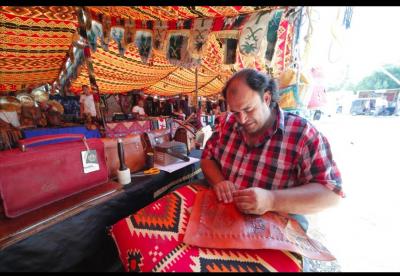For years, Fihri Belhaj has stood before the intense heat of the furnace, creating captivating glass art through glassblowing in an effort to revive the craft of glass shaping, known in Tunisia as "Blouralthi." The glass-making industry is one of the traditional crafts passed down through generations in Tunisia, representing a fundamental component of the cultural fabric. Belhaj, 40, from the Nabeul governorate in northern Tunisia, told Reuters, “To craft a glass piece with your breath and imbue it with your spirit makes it a part of you, which you handle gently so that it remains flawless; this is pleasure in its most beautiful forms.”
Despite the difficulties and effort involved, Belhaj preferred to distinguish himself in his profession in an attempt to rekindle interest in this craft, which has long declined. According to data from the Tunisian Office of Traditional Industries, handicrafts contribute 2% to Tunisia's total exports and provide 10% of annual job opportunities, with traditional craft workshops spread across various Tunisian governorates employing about 142,000 people. Belhaj noted that his passion for glassmaking drove him to learn it. He added, “I studied and learned glass design at a vocational training center in Tunisia to revive this art and work in it tirelessly.”
Fihri participates in local exhibitions and used to export his products to Venice before the 2011 revolution; however, due to difficulties in obtaining the necessary raw materials, he now sells his products through social media.
On the other hand, Haifa Al-Hawat sought to fill her free time without leaving her home, as she is a mother of two daughters, so she turned to the ancestral craft of traditional Tunisian clothing embroidery. In just four years, Haifa has managed to establish herself with traditional products that incorporate some innovation, taking her first steady steps towards establishing her own project.
Haifa spoke to Reuters, her smile unwavering, as if to convey her pride and love for the craft she learned by herself through watching videos on YouTube, as if saying, “I started from nothing and now I have a successful project.” Haifa, 30, added, “When a person discovers their true passion, their life transforms into a realm of joy and happiness.” She continued, “Working in embroidery is enjoyable and beautiful, as if you are stitching immortal artistic pieces with your hands, and all we need to do is develop ourselves and engage in a work environment that encourages innovation and diligence while inspiring others with what we do.”
Haifa did not keep success to herself but shared it with many women, as she began teaching them embroidery after obtaining recognized certificates in Tunisia.
Regarding the youth participation, Samia Fourati, responsible for media and communication at the Tunisian Office of Traditional Industries, told Reuters that "the percentage of youth under 40 investing in the handicraft sector was around 57% in 2022, an increase of about 12% from 2021." She added, "The employment rate of women in the sector was approximately 83.4% in 2022, and the percentage of newcomers to the sector with higher education increased to 11% in 2022 from about 9.4% in 2021."




